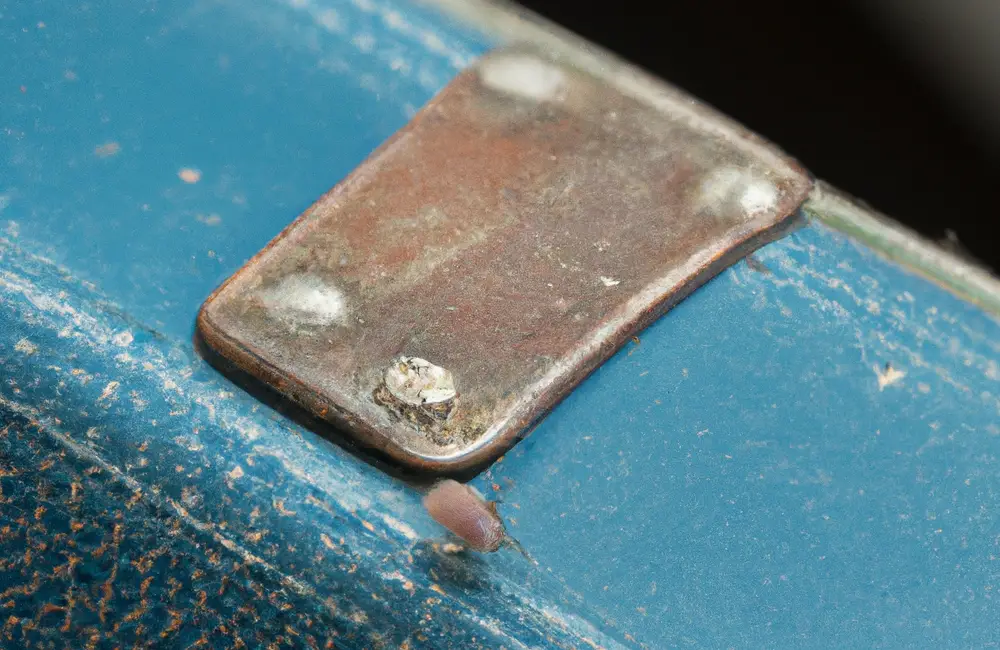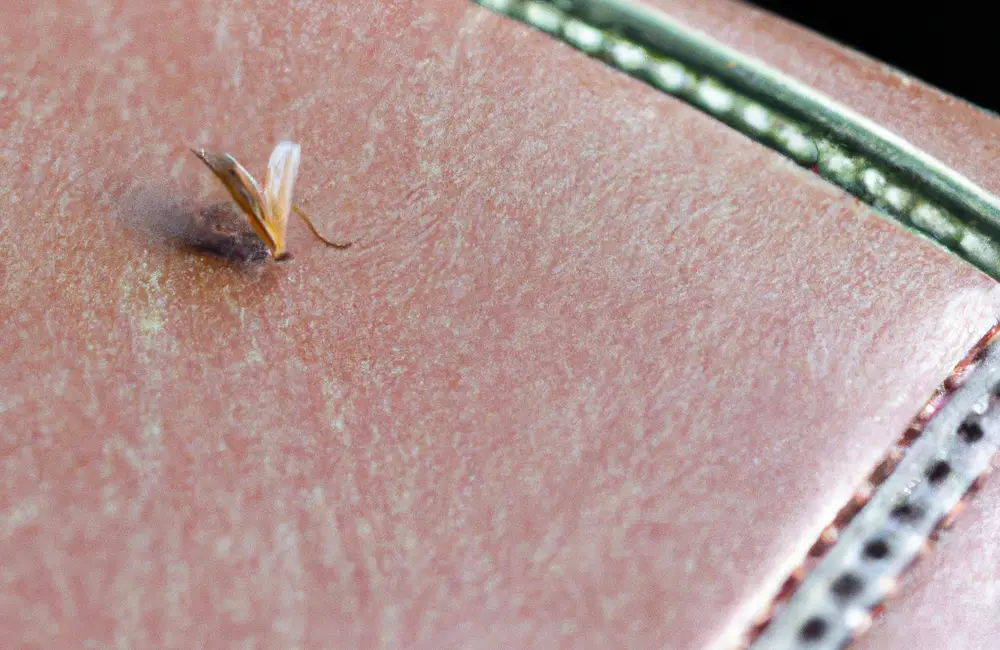Flea issues are the worst and tend to linger longer than other types of pest infestations.
Often when you think you finally have the problem kicked, you see the familiar black specks popping up again and feel the itchy welts as they appear. That’s how it was for me the first time we brought fleas home from our family vacation.
Key Points:
- Fleas can travel easily and quickly by latching onto suitcases, clothes, and visitors’ luggage.
- If unchecked, fleas can survive in suitcases for as many as 50 days.
- Fleas can survive the typical temperatures and air environments associated with airplane travel.
Unknown to us, the fleas had followed us home and taken up residence all over our home. It took flea spray, flea powder, and even flea fumigation to get rid of fleas. It can be even harder in an apartment with fleas as they can be brought in on bags, clothes, or visitors’ luggage.
This article shares all you need to know about fleas traveling on suitcases and finding their way into your home.
Can Fleas Travel in Luggage?
Not only can fleas travel by luggage they love to. By their very mechanics’ fleas are designed to move as far as they can and create flea larvae all over, and lay eggs on any creature they can find.
Luggage, while being used for travel, is often exposed to countless humans, animals, and other suitcases, any of which could allow the transfer of fleas.
Before you know it, you’ll have adult fleas and baby fleas all over your bags, waiting to enter your home.
Fleas go dormant in cold conditions and, by burrowing into your luggage, can often survive sub-freezing temperatures for short periods of time. Likewise, they thrive in hotter climates, so the average temperatures your suitcase goes through are unlikely to deter these persistent pests from finding a blood meal.
Female fleas that have fed at a food source can lay many eggs in your luggage that are likely to hatch around the time you arrive home from your trip.
Ways Fleas Travel?
Other than their innate ability to jump far and high, fleas are also expert hitchhikers. They will travel far and wide and have been traveling the globe as long as humans have. In our modern society, where travel is like food and air, keeping fleas off our bags needs to be a concentrated effort.
Always check hotel reviews for information on fleas and bug problems, and if unsure, use the tips below to keep your luggage flea-free.
| Hitchhike On | How Common | Prevent By |
| Luggage | Very | Place on luggage rack at hotels and spray the suitcase with a natural flea spray and store it in plastic bags when not in use |
| Backpack | Very | If there are any signs of fleas at a place you have traveled, avoid placing your bag on the floor or other likely areas with flea infestation to keep adult fleas from slipping inside |
| Clothes | Very | Fleas temporarily residing on our clothes are one of the most common ways we experience flea bites, so to get rid of fleas on clothes, always put dirty clothes in plastic bags and never leave them on a lodging’s floor |
| Shoes | Somewhat | Your shoes can be a vehicle for these pesky pests, but it is unlikely that any part of the flea life cycle will repeat on shoes, and they aren’t likely a continuous source of fleas; spray with flea repellant to prevent any common type of flea from hopping into your shoes |
| Pets | Extremely | If you will be traveling with a pet, make sure to use a reliable flea collar or safe flea medication, as it is likely that, at some point, pets will pick up fleas |
| Toys and Cuddles | Very | If some stuffed toys end up with fleas, then you may have to flea bomb the entire house, so make sure to wash cloth toys in hot water if exposed to fleas or use natural human and pet-safe pest control methods like essential oils or heat and steam flea treatments |
| Bedding | Somewhat | If you see black spots or brown spots on bedding that you took with you on a trip, to it all in the washing machine and wash it well with hot water and laundry detergent to kill any type of flea |
| Vehicles | Extremely | Bringing in fleas from outside is common in rental vehicles and our personal cars when traveling, so make sure to keep the vehicle clean to remove all food sources for flea larvae and use flea repellent on the floors, seats, cracks, and storage areas to prevent a flea infestation and adult female fleas from following you home |
How Long Can a Flea Survive in a Suitcase?
A flea can survive for 40 to 50 days in a suitcase with adequate oxygen, moisture, and occasional food sources. It is possible that several generations of fleas can live on luggage if stored where fleas are safe and fed.
While traveling, most environmental conditions will not kill fleas, and when storing suitcases, fleas are free to leave to feed and return to breed. Unless you kill the fleas on your suitcase, they are unlikely to die or leave on their own.
Can Fleas Be Transported Easily?

Due to their extremely light body weight, an innumerable amount of fleas could be on your luggage without you ever knowing about it. Fleas are present anywhere humans and animals are, so it is likely that any bags or clothes that you travel with have been contacted by fleas.
When fleas are transported, they are usually just surviving and will do more to set up a nest and breed when the suitcase is stable. If you have anything that attracts fleas or has fleas already breeding in your suitcase, you may find a serious infestation when you arrive at your destination.
Can Fleas Survive An Airplane?
The temperatures in the luggage storage area are survivable for fleas in most circumstances. There is ample air for fleas’ tiny lungs, and they can survive long-haul flights by burrowing into interior parts of the aircraft and by entering pet and passenger areas.
The ascent and descent of the aircraft do nothing to harm the fleas, and they will easily transfer to the next point of travel.
Some aircraft, when flying internationally, spray pesticides to kill certain types of disease-carrying mosquitos, and if this occurs, there is a good chance the fleas will die too.
However, fleas that have made it into your luggage are less likely to be hit by the insecticide and could survive to follow you home. Always use a flea repellent to keep them from choosing your bag to enter.
Can I Prevent Fleas from Entering My Luggage?
It may not be possible to prevent any fleas from ever entering your luggage, but there are ways to make it much less likely that a flea infestation will result from your travels. The best course of action is to avoid staying anywhere where flea or bed bug infestations have occurred recently.
You should also check out accommodation before entering and always place suitcases and bags on counters or luggage racks and not the floor. If you do that and the following preventative measures, you will never have to worry about vacation fleas again.
Wash Everything
After traveling home following a hopefully relaxing vacation, the last thing you want to do is do loads of laundry, but the best way to prevent any pest infestation after a trip is to wash all fabrics in hot water.
After that, dry or hang in the sunlight to make sure no hitchhikers follow you home.
Use Heat and Sunlight
Heat treatments and good ol’ sunlight can do wonders, so leaving your bags out in the hot sun after a trip can help make sure nothing is lurking inside. Make sure to protect delicate fabrics and don’t leave them out longer than a few hours to prevent bleaching or UV deterioration.
A steamer or blow dryer on the hottest setting can also help kill pests in bags without damaging them.
Wrap in Plastic
Keeping luggage stored in plastic between use is a good way to lock in any pests and prevent them from breeding or keep any unwanted insects out.
A trash bag is a good solution but heavy-duty plastic can be easier to reuse and may fit better. You can spray insect killer or repellent before wrapping to make sure nothing is alive the next time you want to travel.
Insect Repellent
Keep a natural insect repellent inside the suitcase and spray it when you are traveling every time you open it. This will keep bugs disinterested in what’s inside and allows you peace of mind when going through your luggage for your next outfit. Opt for a natural spray to prevent unnecessary chemical exposure.
Natural Insect Killer
Placing certain powders like diatomaceous earth or borax in bags when not in use can prevent bugs from surviving inside.
Cinnamon powder can also kill most insects on direct contact and will keep your luggage smelling fresh as well. Simply vacuum out the suitcase before packing for your trip and remove all traces of the powders and any insects, unfortunately enough to seek shelter inside.
Since fleas can travel on luggage, you need to be ready to repel and kill these pests.


